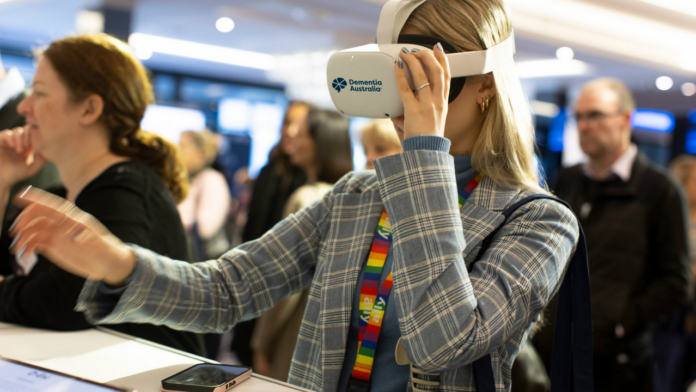Dementia Australia is showcasing an exciting innovation at the Melbourne Convention and Exhibition Centre on 5 June. The organisation is launching D-Esc, a cutting-edge virtual reality (VR) training workshop designed to transform the way frontline and healthcare professionals handle behavioural emergencies in dementia care settings.
D-Esc offers an immersive experience that allows participants to engage with realistic scenarios, helping them develop empathy and understanding towards individuals with dementia. The goal is to reduce the reliance on restrictive practices and decrease the frequency and severity of incidents in care environments.
Dr Kaele Stokes, Dementia Australia’s Executive Director of Services, Advocacy, and Research, emphasised the importance of this training for both the safety and professional development of the workforce and the quality of care for those living with dementia. Dr Stokes noted that behavioural emergencies and occupational violence in aged care require immediate attention and appropriate responses.
Dementia can significantly alter a person’s behaviour, leading to feelings of anxiety, fear, distress, confusion, pain, or disorientation. Effective communication is crucial, as individuals with dementia may struggle to express their feelings or experiences. Care workers must utilise not only verbal communication but also gestures, movements, and facial expressions to convey meaning. Understanding body language and the importance of physical contact becomes essential when speech is challenging for a person with dementia.
Through the D-Esc workshop, participants will enhance their empathy, deepen their understanding of dementia, and develop skills in recognising emotional and physical signs of escalation. They will learn how to reduce the risk of harm for people with dementia, other residents, visitors, and staff. By leveraging VR technology, the workshop builds participants’ confidence and capability to assess and respond to changed behaviours safely.
Phil Hazell, a Dementia Australia Dementia Advocate living with younger onset dementia, highlighted the importance of such training in promoting understanding and awareness around dementia. Mr Hazell stressed the significance of being understood and the role training plays in helping workers approach and support individuals with dementia without making assumptions.
The D-Esc workshop had its initial launch in Sydney on 23 May, followed by Adelaide on 29 May, and now in Melbourne today. Attendees at the Melbourne Convention and Exhibition Centre had the opportunity to experience demonstrations of this innovative training tool.
The workshops cater to frontline health and aged care workers across various sectors, including residential, home, and community care, as well as primary, acute, and disability care. Each in-person workshop lasts three hours and accommodates up to 15 participants.
This program was developed in collaboration with the Applied Artificial Intelligence Institute (A²I²) at Deakin University, supported by the Rosemary Norman Foundation, Fitzpatrick Sykes Family Foundation, Navarra Care Foundation, and Australian Communities Foundation through HDR Australia Fund. With the support of Dementia Training Australia and the Australian Government, the D-Esc workshop is offered free of charge to eligible participants until 2025.
The launch of D-Esc marks a significant step forward in dementia care, providing essential training that can lead to safer and more effective responses to behavioural emergencies, ultimately improving the lives of those living with dementia.
D-Esc is fully funded until 30 June 2025 and is available to 6,500 eligible participants. To confirm eligibility or to learn more, interested parties can visit dementia.org.au/d-esc or contact Dementia Australia at development@dementia.org.au.


